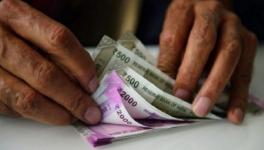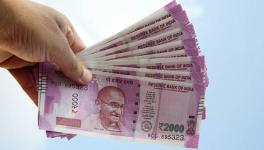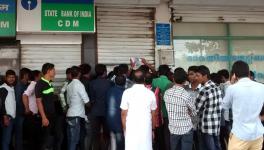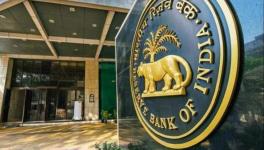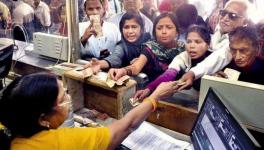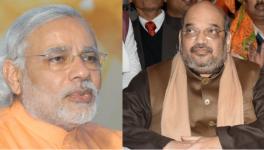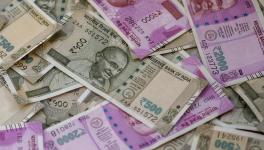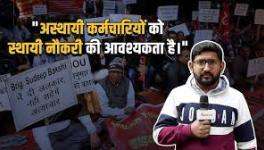Black Money and The Nexus with Tax Havens
Corporate entities across the world have been using tax heavens to deal with funds. It could either be for tax saving purposes or to route money in and out of the county. The impact of black money and tax havens has come into renewed focus with the recently Panama tax haven paper leaks. It may be the biggest heist in the history of mankind, if the Panama tax haven papers are to be held on to. Rich individuals and their families have as much as $32 trillion of hidden financial assets in offshore tax havens, representing up to $280bn in lost income tax revenues to various governments across the world.
To discuss this issue, Newsclick interviewed Editor, Economic & Political Weekly, Paranjoy Guha Thakurta. According to Paranjoy, the way funds have been transferred or handled really hides the ultimate destination where it lands. “There will always be some loopholes but if the authorities of a particular state is determined, there is no reason why it cannot be stopped” he points out.
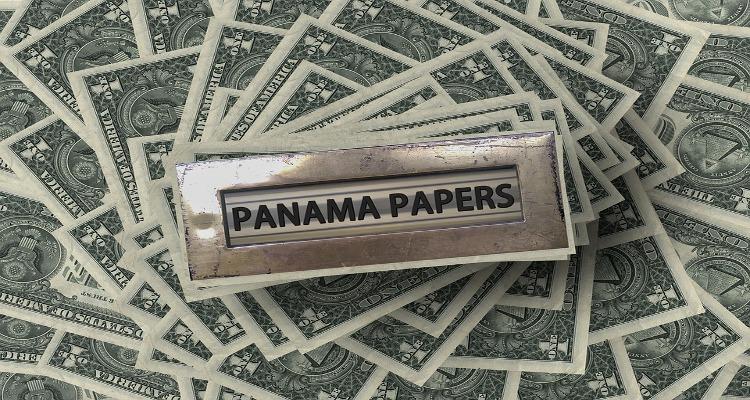
Image courtesy: pixabay.com
Rough Transcript:
Bipin Chandran (BC): Hello and welcome to Newsclick. Indian companies have been using tax hvens to bring in funds to India as well as route money outside the country. The impact of black money and tax heavens has come into renewed focus with the recent Panama Tax Haven paper leaks.
To discuss this we have with us Editor, Economic & Political Weekly, Paranjoy Guha Thakurta. Paranjoy, thank you for joing us. Indian companies have been using certain overseas companies to move money inside as well as outside the country. How does it really works and what are the benefits these companies getting out of it?.
Paranjoy Guha Thakurta (PGT): The use of tax havens by different corporate entities and wealthy individuals what are called high net worth individuals. This is a phenomenon that is not unique to India. It is happening across the globe. If you look at the world, there are somewhere in the region of about 90 jurisdiction which could be described as tax havcns. Though the authorities and people who live in these areas they often call themselves low tax jurisdiction or no tax jurisdiction. One of them is Panama. Now, these jurisdictions are often located in small islands sometimes called treasure islands which has been described, that's title of a book in fact, but say country like the United Kingdom it alone at different points of time have encouraged the establishment something like 18 tax havens Isle of Man, British Virgin Islands, Guernsey It goes on and on. It is interesting that within countries say the United States of America, there are tax havens. For instance, the state of Delaware in US, the state of Florida, the state of Arizona. These are among the 50 states of united states of America, there are tax havens. Say in Europe, there are what are called micro states of principalities like Liechtenstein, San Marino, like Monaco. These are also within the European Union small sovereign condemnation states if you like, call them nation states if you like, call them principalities, call them micro states where there are little or no tax. What happens is what we are seeing across the globe is that these areas encourage companies and rich individuals to park them money because they offer them secrecy and the dividing line between what you say legal forms of tax avoidance and illegal forms of tax evasion which includes money laundering, converting illegal money into legal money through a process which is called round tripping where the money moves rapidly across different jurisdiction or a process which is sometimes called treaty shopping you take advantage of double taxation avoidance treaties of different jurisdiction. The whole purpose is to create situations where you pay very little tax, you pay no tax. Now, this had been going for years, why years, for decades. But after the great recession of 2008, that very countries that had one point of time promoted the establishment of these kinds of tax havens, including countries that had one point of time promoted the establishment of these kinds of tax havens including the countries that are part of the OECD, the organisation of the economic cooperation and development rich countries, they started realize how their government is suffering. Well known companies whether they will be Walmart, Apple, Yahoo many of these companies, large multinational cooperations and conglomerates were basing headquarters and therefore, they were avoiding payment of tax. So after the great recession countries were more than alarmed and the OECD had a special initiative called BEPS, Base Erosion and Profit Shifting Initiatives. So the whole idea is to shift profits from one jurisdiction to the other so you don't pay taxes on them and today, this has been talked about by everybody. From President Barack Obama of the US to the head of the world bank and everybody and his brother are today expressing concerns how this tax haven are being misused not merely to legally avoid payment of taxes but for illegal purposes for nefarious activities where you convert money that has been obtained through illegal means into legal money.
BC: US has been opposing these tax havens in the earlier. But now they seem to be soft pedaling on the whole issue and they are willing to follow the OECDs proposed standards. Isn't it double standard there?
PGT: There is a huge amount of hypocrisy and double standard. As I mentioned earlier, within the US there are tax havens. States like Delaware. You look at any Indian company which has set base in US they invariably have headquarters in Delaware or Florida. So there are tax havens within the US the first point. The second point is you know countries like Panama, the countries which are part of West Indies St. Kitts, Kaymen islands these are all tax havens in proximity to the United States of America. Now whereas the Panama Leaks has focused on non-American leaders whether it be relatives of Vladimir Putin, the Chinese Premier or the head of Island, Spain or Pakistan. The fact is this is not to say that those who are operating out of the US or those who are operating out of other countries in Europe are squeaky clean and you know, the hypocrisy that I was mentioning earlier goes beyond this. You know the same countries which had once upon a time encouraged tacitly or covertly, the working of these tax havens are today feeling the pinch. I mean, Britain is the classic example. Today David Cameroon's father may have been implicated in one of these or it is been found that he had investments through one of these shell companies in Panama, but the fact is in Britain alone has about 18 so called tax havens which comes within the jurisdiction. Many would argue even the financial centre in the London, the city of London as it is called is also very much aware and part of this whole complex chain through money moves rapidly across jurisdiction so that it becomes regulatory authority to detect the real owners, the beneficial owners. It becomes difficult for regulatory authorities to lift the corporate veil to unearth the very complex patterns of corporate ownership which conceal and which seek to obfuscate the way money move illegally across the globe.
BC: It means some of these countries are trying to be the next Switzerland.
PGT: You know Switzerland may soon loose it's position as a biggest centre for providing the financial services. I personally have met a person in Singapore who said soon Singapore will overtake Switzerland in terms of the sheer volume of businesses and services what often euphemistically called financial services, accounting services. Essentially services that help people set up different kinds of corporate entities which are used for a variety of purposes. Some legal, some not so legal they are many gray areas in some of these corporate entities operate. The whole purpose is to ensure secrecy, to ensure regulatory bodies say in India bodies like SEBI, Securities and Exchange Board of India. Say the RBI they find it extremely difficult to follow the trail, to unearth the way in which companies are held. The intricate patterns of cross holding of ownerships this is why these kinds of countries specialize and provide range of services including how to set up corporate entities.
BC: Can it ever be prevented? It looks likes it can not be I mean. There will be loopholes somewhere always.
PGT: There will always be some loopholes if the authorities of particular states are determined, there is no reason why it can't. It's not a coincidence that the BEPS of OECD they are trying and they have been trying in the last few years put together what is called automatic information exchange network. So all such information is automatically put into a network which can be accessed by regulatory authorities. Interestingly, among the countries that have opposed being a part I mean there are over hundred companies which have agreed including India but Panama hasn't agreed and so hasn't Bahrain, so hasn't two small countries in the Pacific. One of them is Nauru and the other is Tuvalu, these are very very small countries. Their population is equal to a small locality in the city we are talking that's Delhi. But, a few of these countries are very very assiduously resisting participating in international initiatives which will lead to automatic exchange of information which is different from where a criminal complaint is filed and a particular law enforcing authority approaches a particular government and seeks information on specific corporate entities or specific individuals. This network will lead to a fair amount of information being automatically exchanged and there are still a few countries who are resisting this move.
BC: What are the obvious fall outs of this tax havens and parking money who are routing money through there apart from regulatory purposes obviously there is obvious tax loss that's happening?
PGT: What you see and this is what the Panama Leaks have indicated. Remember, the Panama leaks is the biggest leak of information in human kind and mind you it is just one company, one firm of lawyers, one Mossack Fonseca based in Panama. Yes, there may be large number of corporate entities that the data pertains to long period of times but this is after all is just one company. Imagine, the huge amount of information that exists. That's point one. What's the kind of information? Where do terrorist get money. When people are trafficking human beings, when people are trafficking illegal substances drugs, contraband, it could be bullion, it could be diamond illegally obtained, it could be antiques, it could be stolen paintings. It could be animal parts, it could be parts of endangered species.
All these kinds of illegal activities that are taking place. Where do they get the money? Where do the funds come from? Who funds them ?This is not the first time. But say in India, successive individuals have held the post of National Security Advisor have said yes, our stock exchanges are being used to launder money by terrorist. The whole idea, these tax havens make it difficult for law enforcing authorities to trace the real owners, the beneficial owners. So if company A is owned by company B and in turn is controlled by company C which in turn is controlled by the famous D company it becomes difficult for the law enforcing authorities in India to lift their corporate veil to find out who are the genuine owners, who are the real people, who are the beneficial owners of these companies. So what these tax havens do is facilitate the whole range of illegal and nefarious activities so when you look at the different atrocities that are taking place in conflict zones, in war zones, when you look at economies that are war ravaged. When you look at human beings who are being trafficked, you can know that behind the money that is generated behind the big bucks that are involved in all these kinds of nefarious and illegal activities. There is a very strong possibility, that there is some tax haven or the other which is a part of these kinds of illegal, criminal networks of this global, you know the illicit flows of funds across the globe.
BC: We have a government that has promised to bring entire black money into the country within 100 days of taking power. Nothing has happened it's been almost two years. Is there a lack of political will? Do you see a lack of political will there?
PGT: The President of the BJP said it is Chunavi Jumla. Now that's a very quaint phrase which means this was an exaggerated claim. I think there were some individuals in India who had made all kinds of estimates and argued that huge amounts of money had been taken out of India by Indians and kept in various places including in Swiss banks. Now former Deputy Prime Minister of India Mr. L.K. Advani too had talked about bringing the money back. In the run up to the 2014 elections Mr. Narendra Modi had repeatedly made it clear that his government would bring back all the money and some of his supporters like Baba Ramdev said no within hundred days this money will be brought back. But thereafter, Mr. Modi himself realized pretty early in his term I think if I am not mistaken sometime in November 2014 in one of his Mann Ki Baat Radio Programmes where he said he really doesn't know how muney. So from making a claim before the elections that every poor family in India would get 15 lakh Rupees but some months later was found that not only did the government not know what kind of money. The chances of that money coming back to India are remote simply because the money is not going to remain in this bank, that money is going to be spent and that money is going to be recycled and some of that money might come back to India laundered white. It may have been black money left India by the time it come back to India it's absolutely white and an act has been enacted by parliament penalizing Indians who are holding assets abroad illegally but these schemes have yielded away small amount of revenue for the government. When you compare it to the total size of the parallel economy, when you look at the total size of the black economy more recently in February of 2016 Finance Minister Mr. Arun Jaitley has also given a kind of a compliance window for the people to declare there, undeclared income he does not like it being described as an amnesty scheme or a Voluntary Disclosure of Income Scheme but many of us believe, I think very dissimilar about it but time alone will tell what kind of money or how much of that black money will come to the government. But surely, I think Mr. Modi, Mr. Amit Shah, Mr. Arun Jaitly all of them realize that's one thing to make a claim to the run up to the elections and actually implement that promise and there is a huge difference between the claim is made and what is reality.
BC: Thank you Paranjoy. Thank you so much for joining us to discuss such a pertinent issue.
DISCLAIMER: Please note that transcripts for Newsclick are typed from a recording of the program. Newsclick cannot guarantee their complete accuracy.
Get the latest reports & analysis with people's perspective on Protests, movements & deep analytical videos, discussions of the current affairs in your Telegram app. Subscribe to NewsClick's Telegram channel & get Real-Time updates on stories, as they get published on our website.










